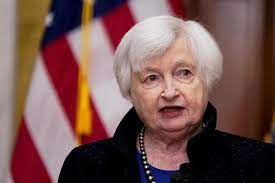Visit by US Treasury Secretary Yellen to China will highlight the need to “responsibly manage” relations
The United States announced Sunday that Treasury Secretary Janet Yellen will go to Beijing this week. This will be the second trip to China by a cabinet member since relations between the two largest economies in the world soured early this year.
According to a statement from the Treasury Department, Yellen will talk with her counterparts on how crucial it is for both nations to “responsibly manage our relationship, communicate directly about areas of concern, and work together to address global challenges.”
Yellen’s trip, which is scheduled to take place from July 6 to 9, will take place just a few weeks after Secretary of State Antony Blinken visited President Xi Jinping and Foreign Minister Qin Gang in Beijing in June.
Blinken was the highest-ranking American official to go to China’s capital in over five years, and Xi claimed to have seen progress in the tense relationship between Washington and Beijing during the unusual visit.
Yellen will speak in Beijing on how the US sees its trade ties with China, a senior Treasury official said on Sunday.
The American spokeswoman added without going into detail that she would meet with key Chinese officials as well as executives from renowned US companies.
The source noted that although the US aims to safeguard its national security interests and uphold human rights, such efforts are “not intended to gain economic advantage over China.”
Along with seeking collaboration on pressing issues like climate change and financial crises, Washington also aspires to “healthy” relations with Beijing and does not intend to decouple the economies, the American official said.
The Treasury source said, “The United States does not anticipate “major breakthrough” from this first trip, but it does hope to establish longer-term lines of communication with China.
– Resuming the relationship
According to Edward Alden, a senior member at the Council on Foreign Relations (CFR), “I think the US government is clearly trying to put some floor under the deterioration of the economic relationship,” when asked about the Treasury secretary’s plans to visit China.
He said that the US had changed from being unclear about how far it was backing decoupling to expressly embracing a policy of “derisking” in its place. A Yellen visit might “restart a steady pattern of engagement at lower levels,” he said.
In other words, “focusing on a narrower range of items that have strategic importance, trying to build fences around those items, but otherwise trying to continue to nurture a reasonably robust US-China economic relationship,” according to Alden.
However, experts do not anticipate a rapid reduction in tensions.
An issue that has infuriated Chinese officials is that President Joe Biden’s administration is developing a scheme to prohibit some US export investments involving sensitive technology with significant national security implications.
Amendments to China’s anti-espionage legislation, which recently expanded the definition of spying while outlawing the transmission of information relevant to national security, are another potential sticking point. This approach has alarmed both local and international firms.
Reporters were informed by a senior Treasury official on Sunday that Washington would want to express its displeasure with the measure.
The US intends to deepen and up the frequency of contact with China and to “stabilize the relationship,” avoiding misunderstanding and extending cooperation where feasible, the person said. However, substantial issues may not be addressed in a single trip.
Global growth and debt issues
Talks between US officials and those from the second-largest economy in the world “are important to help spur stronger global economic growth and to tackle the mounting debt problem of the Global South,” said Wendy Cutler, vice president of the Asia Society Policy Institute, in reference to a potential Yellen visit.
Chinese officials, for their part, are “looking for concrete steps taken by the US to show that ‘decoupling’ and holding back China is not the ultimate goal of the United States,” Cutler said.
However, authorities probably are aware of China’s persistent reliance on exports and the significance of the US market, CFR’s Alden said, despite US measures that have angered Beijing.
“I think there’s a growing awareness in Beijing that China also needs to play a role in nurturing this economic relationship with the United States, because it’s simply too important to China as well,” he said.
Recent disputes between Washington and Beijing have included trade, human rights, and other concerns.
This year, tensions between the two countries increased when the US shot down a Chinese balloon it said was being used for spying, a charge China vehemently refuted.
However, Beijing’s response to Blinken has been seen as a metaphor for cooling conditions.







